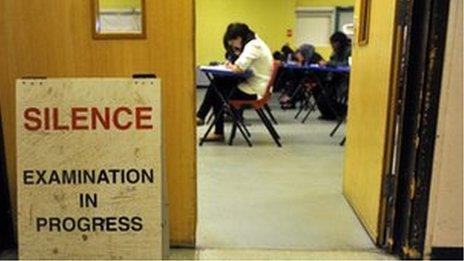Cambridge urges schools to enter students for AS-levels
- Published

Cambridge says AS-levels show if an application is likely to be competitive
Cambridge University has written to schools and sixth forms urging them to continue to enter students for AS-level exams at the end of Year 12.
The leading university says the exams provide a "strong measure of applicants' recent academic progress".
AS-levels were brought in under reforms introduced in 2000, when traditional two-year A-levels were split in half.
But from 2015 in England, AS-levels are due to be split into a separate qualification from A-levels.
Currently, pupils sit AS-levels in the first year of the sixth form (Year 12) and A2s in the second; the scores are combined to form a final grade.
Under controversial reforms announced by the former Education Secretary, Michael Gove, traditional two-year A-levels with end-of-course exams will be brought back in.
A-level candidates will no longer sit exams after one year and will instead be tested at the end of their two-year course and the AS-levels will become a separate qualification.
Letter from Cambridge
Cambridge is urging schools to enter students for the exams, saying they are a "robust indicator of student progress".
In the letter to schools and sixth forms, Dr Mike Sewell, director of admissions for the Cambridge colleges, says: "We strongly encourage potential applicants to take AS-level examinations in at least three, and preferably four, subjects, whether reformed or not, at the end of Year 12.

Cambridge says its admissions goal remains to select the best students
"This will provide us with a strong measure of applicants' recent academic progress, will assist us and the students in judging whether an application to Cambridge is likely to be competitive, and will provide reassurance that grade predictions are not relied upon too heavily in a new system.
"AS-levels taken in four subjects can provide an extremely useful, externally assessed exam that will avoid schools and colleges having to resource and run their own internal mocks."
The letter says AS-levels help students choose three subjects for Year 13 - if they are dropping one - in an informed way.
They also provide encouragement in advance of university applications for "bright but under-confident" candidates, as well as providing them with recent public exam results to boost their applications.
"Our admission goal remains to select the best students, regardless of their educational regime," Dr Sewell concludes.
"We are committed to ensuring that no student is disadvantaged within our processes by the model of provision offered by their educational institution."
Controversial
The plan to decouple AS-levels has proved controversial, with universities, head teachers and MPs raising concerns.
Cambridge has previously warned that for admission to its courses, AS-levels are the best predictor of how well a student will perform in every subject except maths, and argued that the move risks damaging a decade's-worth of work to encourage more disadvantaged teenagers to study at the institution.
Ministers have argued that universities learn little more from knowing teenagers' AS-level results in addition to GCSE grades and have insisted the reform should not affect university admissions.
Labour has indicated that it would reverse the move, which would mean AS-levels would remain linked to A-levels.
Martin Doel, chief executive of the Association of Colleges, said: "A third of all A-level students study in further education and sixth form colleges and they consistently tell us that AS-levels are vital indicators to student performance.
"Therefore Cambridge University is absolutely right to lead the calls for their retention. The whole education system should be working together to protect these valuable qualifications."
A Department for Education spokeswoman said decoupling AS-level from A-level would end "the routine of automatic, external assessment of students at the end of Year 12.
"Removing this unnecessary burden from teachers and students means young people will have more time to study the fundamental concepts of a subject rather than sit through an endless treadmill of exams.
"Students will still be able to sit an AS before deciding whether to take a subject at A-level, but will no longer be required to do so."
- Published14 May 2013

- Published4 May 2013
